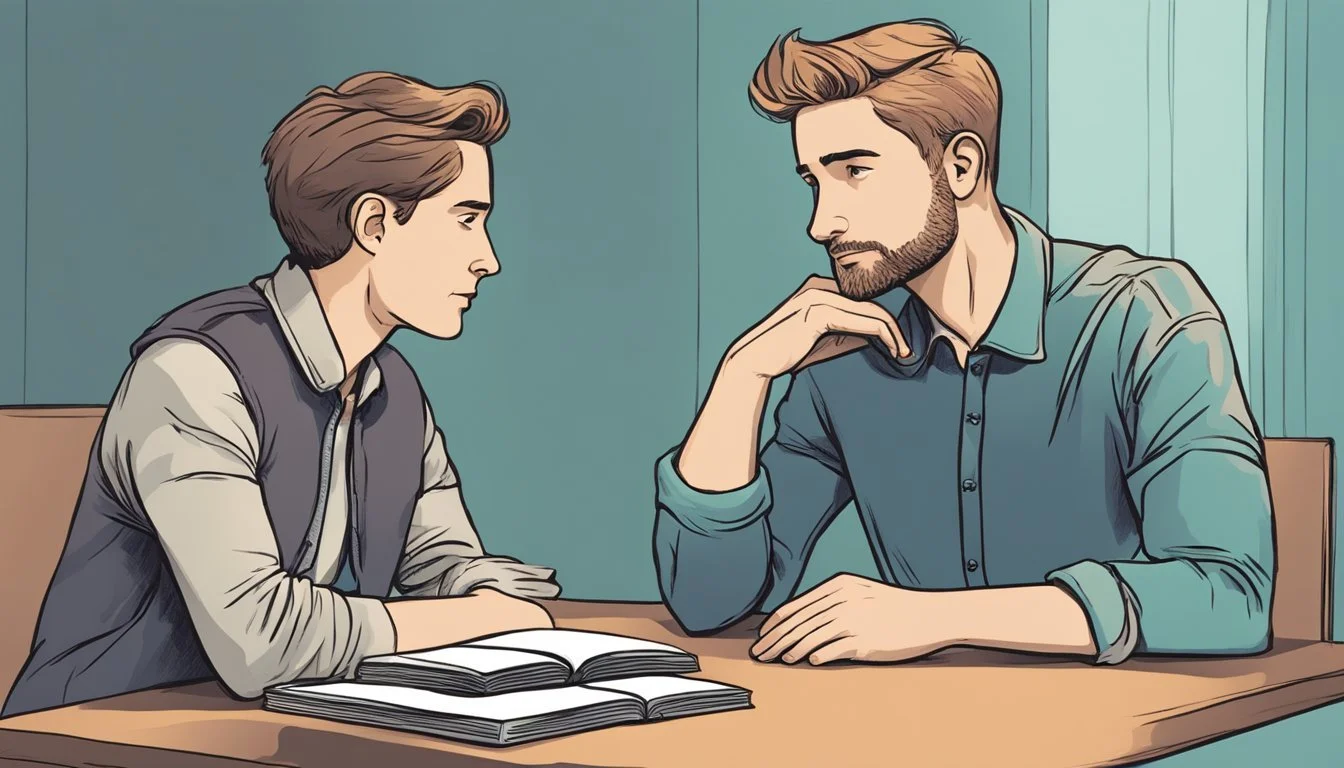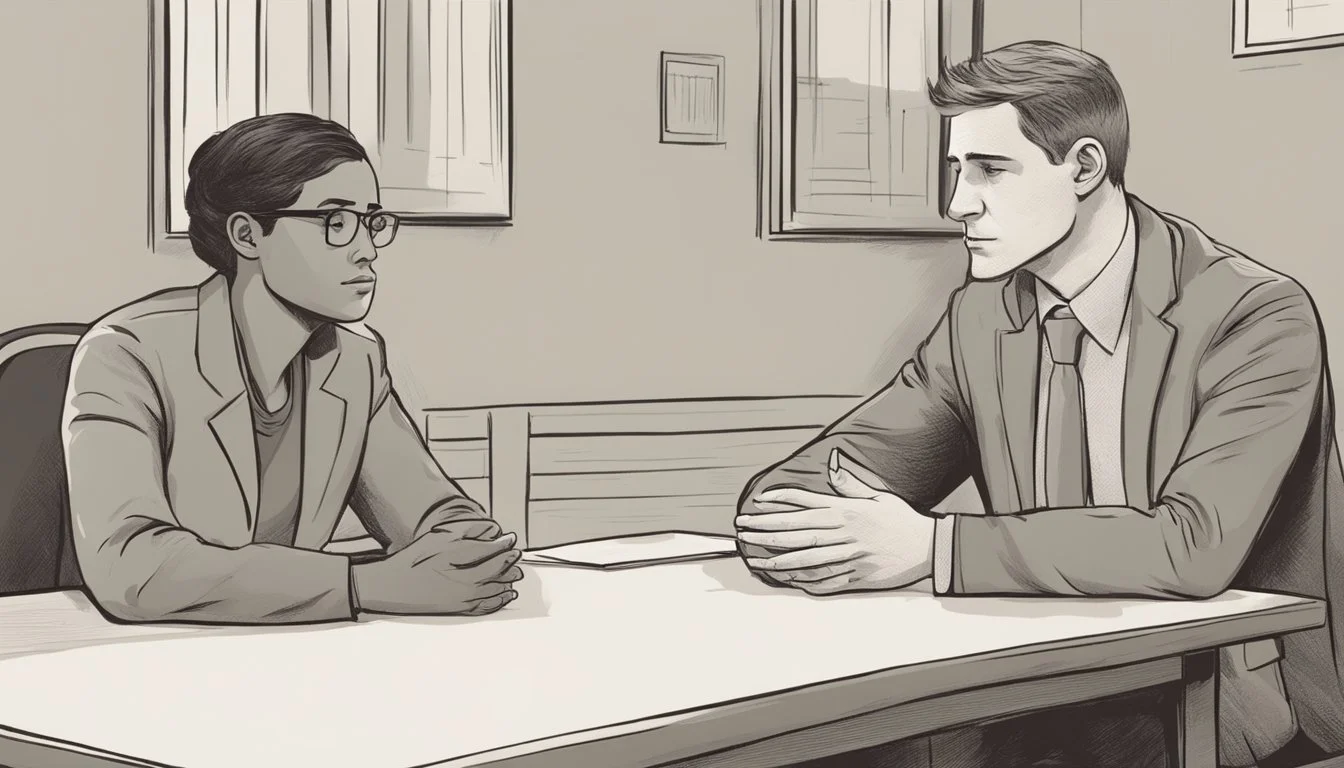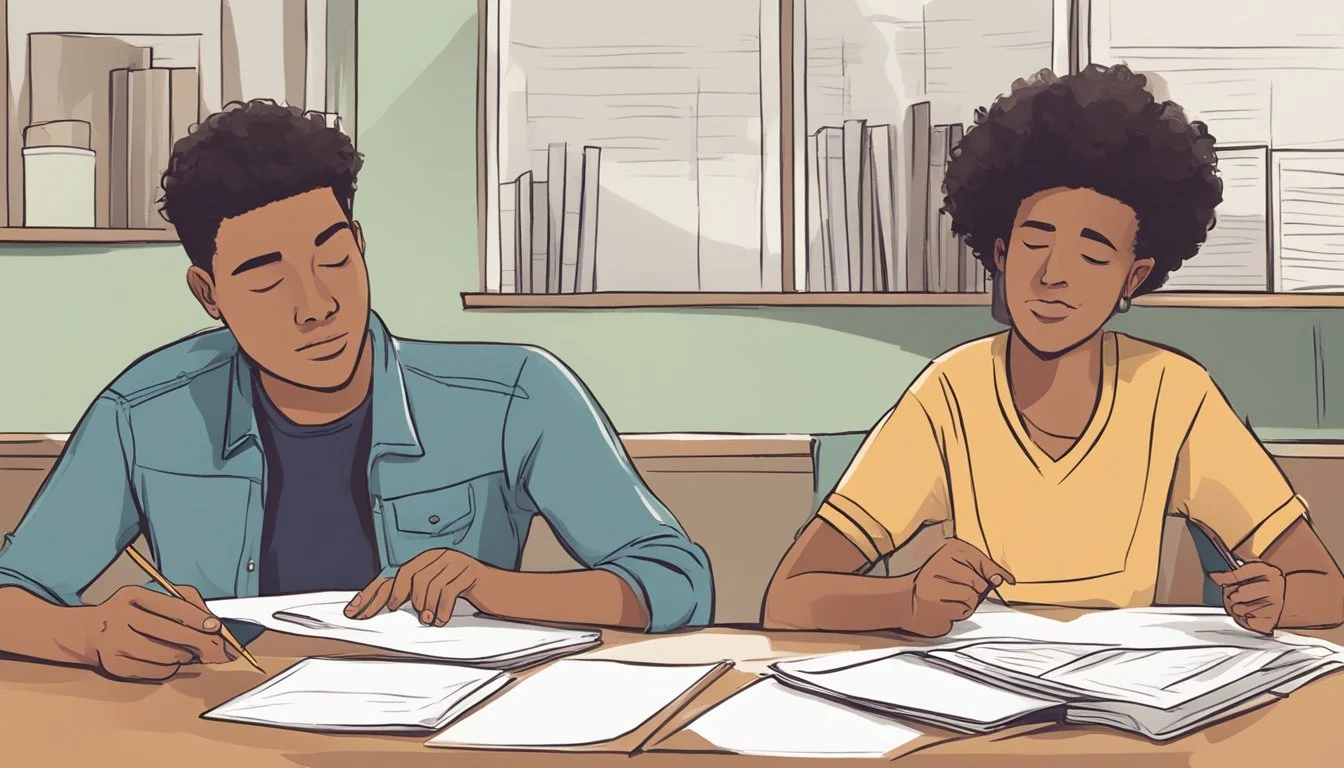9 Strategies for Coping When You and Your Friend Have a Falling Out
Expert Advice for Rebuilding Connections
Friendship, like any other relationship, can face challenges that sometimes lead to a fallout. When emotions run high and words are exchanged, it can feel like you're navigating a stormy sea with no land in sight. Learning how to cope with the aftermath of a friendship breakup is crucial for personal well-being and emotional growth.
Understanding the dynamics that lead to such rifts is the first step towards healing. Once the immediate shock subsides, it's essential to find ways to process the experience and move forward. This article will explore practical strategies to help you cope and heal effectively.
1) Open a Dialog
When conflicts arise, the first step towards resolution is communication. Opening a dialog with your friend can help clarify misunderstandings and express your feelings. A calm, non-confrontational tone is essential. They should avoid laying blame and instead focus on how the situation made them feel.
Choosing the right time and place for this conversation is crucial. It should be in a private, comfortable setting where both parties can speak freely. They should also ensure that both individuals are in the right frame of mind to talk.
Active listening plays a significant role in these conversations. Each person should listen without interrupting, showing empathy and understanding. Acknowledging the friend’s perspective can help to bridge gaps and foster mutual respect.
Using "I" statements can help convey personal feelings without accusing the other person. For example, saying "I felt hurt when..." rather than "You made me feel...". This approach can make the conversation less defensive.
In some cases, involving a neutral third party can be beneficial. This mediator can facilitate the discussion and ensure both sides are heard. Seeking professional advice, such as from a counselor, can also provide structured support during these conversations.
2) Express Your Feelings Honestly
Communicating emotions plays a pivotal role in resolving conflicts. It may be helpful to begin by calming down, perhaps through deep breathing, which can improve cognitive function and help process thoughts more clearly (Psych Central).
Using "I" statements can make a significant difference. For instance, saying "I feel hurt when..." instead of "You always..." focuses on personal feelings without sounding accusatory. This approach can foster a more constructive dialogue.
Writing thoughts in a journal can also be therapeutic. This practice aids in organizing emotions and can enlighten one about the root of their feelings (Calm Blog).
Empathy enhances communication. Trying to understand the other person's perspective can create a more empathetic exchange (Choosing Therapy). This mutual understanding often eases tension and clears the path for honest conversations.
Lastly, avoiding exaggerated language and sticking to the facts can help clarify the situation. Honest expression of feelings, when done thoughtfully, paves the way for genuine healing and resolutions.
3) Practice Active Listening
Active listening is a crucial skill for resolving conflicts and mending relationships. It involves fully concentrating, understanding, and responding thoughtfully to a person speaking. This practice helps to validate the other person's feelings and shows that their perspective is valued.
To practice active listening, start by being fully present in the conversation. Eliminate distractions and focus entirely on the speaker.
Use non-verbal cues, such as nodding and maintaining eye contact, to show engagement. These small gestures can make a big difference in communication.
Ask open-ended questions that encourage the speaker to share more. This helps in understanding their point of view better. For example, questions like "How did that make you feel?" invite more in-depth responses.
Paraphrasing and reflecting back what has been said ensures accurate understanding. Phrases like "What I hear you saying is..." can clarify the message.
It's essential to listen to understand rather than to respond. This means refraining from interrupting and allowing the speaker to express their thoughts completely. After they finish, provide feedback that acknowledges their feelings and perspective.
Active listening can improve communication and rebuild trust. It shows respect and a willingness to resolve disagreements amicably. For practical tips on active listening, visit Verywell Mind's guide on active listening techniques.
4) Set Boundaries
Establishing clear boundaries is essential when dealing with a falling out with a friend. It helps protect personal well-being and preserves the integrity of the relationship. Clearly communicate your limits and expectations without being apologetic or making excuses.
Use "I" statements to express your feelings and needs. For example, say, "I need some time to process our discussion," rather than casting blame.
Be firm yet kind. Stress the value of the friendship while maintaining your stance. This approach ensures that you respect both your space and theirs.
Listen to their perspective. Acknowledge their feelings, but don't back down if they try to cross your boundaries. It's crucial to stay consistent and committed to your needs.
Accept any discomfort that might arise, whether it's guilt or sadness. These emotions are natural but shouldn't deter you from maintaining your boundaries.
Reiterate your care for the friendship. Remind them that setting boundaries is a step towards a healthier and more respectful relationship.
Setting boundaries isn't just for the moment of conflict. It’s a continuous effort that guarantees mutual respect and understanding. It can greatly improve the quality of any friendship. For more detailed guidance, you can read about how to set effective boundaries.
5) Seek Mediation if Necessary
Sometimes, when a conflict with a friend seems insurmountable, seeking mediation can be a valuable step. Mediation involves a neutral third party who assists both sides in navigating their differences effectively. This approach can facilitate a structured conversation and ensure that both parties feel heard.
In cases where emotions run high, a mediator can help de-escalate tension. The mediator will guide the interaction and keep the discussion productive and focused. This professional can be particularly beneficial if the conflict has reached a point where direct communication is no longer effective.
Not all conflicts are suitable for mediation, but for those that are, it is often a constructive solution. Familiarize yourself with different types of mediation, such as facilitative mediation, to understand which might be the best fit for your situation.
Consider how mediation can provide a safe space for expressing your needs and concerns. When both friends are willing to participate, it often leads to a mutually acceptable resolution. If the relationship is important to both parties, a mediator can play a crucial role in rebuilding trust and understanding.
6) Give Each Other Space
Giving each other space can allow emotions to settle and perspectives to shift. This distance can help both parties reflect on their feelings and the situation. It is essential to set clear boundaries during this period.
Celebrating individuality is a crucial aspect of giving space. By respecting each other's need for freedom and trust, both people can maintain their authenticity. This creates a healthier dynamic without the pressure to appease one another constantly.
Discuss how much time is needed for space. Clear communication about this can prevent misunderstandings. Each person’s needs are different, so determining a specific timeframe can make this process smoother and more effective.
During this time, engaging in independent activities can be beneficial. Activities like walking, yoga, or other hobbies allow for personal growth and stress relief. Each person can then come back to the relationship with a refreshed mindset.
Avoid frequent check-ins that might seem intrusive. Trusting the process and giving genuine space is important. This shows respect for each other’s boundaries and the need to regain balance. Patience here is key.
Setting boundaries and being respectful of them ensures that the space given is meaningful. By being clear and respectful, both parties can navigate this period without additional conflict. Communicate any concerns calmly to maintain mutual understanding.
7) Reflect on the Situation
Reflecting on the situation allows an individual to analyze what happened objectively. It involves taking a step back and considering the events that led to the disagreement.
By reflecting, one can identify their own actions and reactions. This helps in recognizing any patterns or triggers that may have contributed to the falling out.
Reflection also involves considering the friend's perspective. Understanding their feelings and reasons can provide valuable insights into the conflict. It might reveal misunderstandings or miscommunications.
Writing down thoughts and feelings during this process can be helpful. This method can make it easier to organize emotions and pinpoint specific issues.
Taking time to reflect can also provide clarity on what one values in the friendship. Identifying these values aids in making informed decisions about the relationship moving forward.
It's essential to approach reflection with an open mind. Avoiding defensiveness allows for a more honest assessment of the situation. This mindset can pave the way for genuine growth and reconciliation.
Engaging in self-reflection can reduce emotional intensity. This makes it easier to approach the friend with a calm and clear mind if they choose to reconnect.
8) Apologize Sincerely
Apologizing sincerely is crucial when you and your friend have had a falling out. A genuine apology shows that you recognize your mistake and regret any hurt caused.
Start by acknowledging what you did wrong. Clearly state the specific action or words that caused harm. This demonstrates that you understand the impact of your behavior.
Express remorse. Saying "I'm sorry" is important, but make sure it comes from the heart. Convey an understanding of the pain you caused and show empathy toward your friend’s feelings.
Take responsibility for your actions without trying to justify or explain them away. Avoid using phrases that deflect blame, such as "I'm sorry if you were offended."
Promise to avoid the same mistake in the future. This assures your friend that you are committed to improving your behavior.
Consider discussing boundaries and expectations within the relationship. This can help prevent similar issues from arising again. It’s important to make it clear that you are willing to learn and grow from the experience.
When face-to-face apologies aren't possible, a phone call can be effective. Ensure your tone reflects sincerity and genuine regret.
Remember that a sincere apology can open the door to healing and rebuilding trust. For more tips on making heartfelt apologies, visit Verywell Mind and Good Housekeeping.
9) Focus on the Positive Aspects
When a friendship experiences a rough patch, it's easy to dwell on the negatives. Instead, focusing on the positive aspects can help improve the situation.
Think about the good times shared with your friend. Memories of laughter, support, and joy can remind you of why the friendship matters.
Focus on the good qualities of your friend. Remember their kindness, sense of humor, or any trait you admire.
Shifting your perspective can positively impact your emotional well-being. Positive thinking can reduce stress and improve your mood during difficult times.
This approach can lead to a more balanced view of the friendship. It might even help you find a way to mend the relationship.
By highlighting the positive, you can approach the situation more calmly. It can also make it easier to communicate effectively with your friend.
Understanding the Emotional Impact
Experiencing a falling out with a friend can trigger a variety of emotional responses. Recognizing these feelings and validating your emotions are crucial steps in coping effectively.
Recognizing Your Feelings
When a friendship faces conflict, identifying and acknowledging your emotions is fundamental. Everyone reacts differently, so emotions may range from sadness and anger to confusion and betrayal. Awareness of these reactions helps in addressing them appropriately.
Sometimes, unresolved emotions can manifest as physical symptoms, such as headaches or fatigue. Therefore, taking time to reflect on your feelings can clarify what specifically is causing the distress. Writing down your thoughts in a journal can be a helpful way to articulate these emotions clearly.
The Importance of Emotional Validation
Validating your emotions means acknowledging that what you are feeling is legitimate. This can be done through self-talk or discussing your feelings with a trusted individual. Emotional validation helps reduce feelings of isolation and makes it easier to navigate through the emotional turbulence.
Engage in activities that provide comfort and support, such as speaking with a mental health professional or practicing mindfulness techniques like deep breathing. These strategies can aid in managing the emotional impact more effectively. Understanding that it's natural to feel a range of emotions can foster a healthier emotional response over time.
A heartfelt conversation or meditation can provide the emotional grounding needed to move forward after a falling out with a friend.
Effective Communication Strategies
When dealing with a falling out with a friend, choosing the right time and place for discussions and using "I" statements can significantly improve the chances of a productive conversation.
Choosing the Right Time and Place
Selecting an appropriate moment and environment is crucial. Avoid starting sensitive conversations in public places or during stressful times. Opt for a quiet and private setting where both parties can speak freely without distractions.
Timing also plays an important role. Ensure both individuals are calm and have enough time to discuss the issue thoroughly. Rushing through a conversation can lead to misunderstandings and further conflict.
Additionally, respecting each other’s schedules and emotional states contributes to a more effective dialogue. Take the initiative to ask when it would be convenient for the other person to talk, showing empathy and consideration.
Using "I" Statements
"I" statements help express feelings without blaming or accusing the other person. Instead of saying, "You never listen to me," which can sound confrontational, say, "I feel unheard when we talk."
These statements reduce defensiveness and open up a path for honest expression. They focus on specific behaviors and personal emotions, which helps in addressing the root causes of the conflict.
Moreover, "I" statements facilitate empathy by making it clear how the actions of the other person impact one's emotions. This approach fosters mutual respect and understanding, paving the way for reconciliation and a stronger relationship.
Maintaining Perspective
When experiencing a falling out with a friend, it's crucial to maintain perspective by evaluating the friendship's value and staying true to your personal values. This helps in making informed decisions that align with your well-being and principles.
Evaluating the Friendship
Start by assessing the overall quality and significance of the friendship. Think about how long you have been friends and the good memories shared. Reflect on whether the friendship is mutually beneficial or if it has become one-sided.
Key Questions to Ask:
How do you feel after interactions with this friend?
Has the friend been supportive and understanding during tough times?
Do you share common interests and values?
By evaluating these factors, one can decide whether the friendship is worth mending or if it’s healthier to move on. This assessment ensures that the decision is not clouded by momentary emotions but based on the substantive value of the relationship.
Staying True to Your Values
In any conflict, staying true to personal values is essential. This means not compromising on what is fundamentally important to you for the sake of mending a relationship. Reflect on your core values such as honesty, loyalty, and respect.
Things to Consider:
Are your values respected and reciprocated by your friend?
Does reconciling align with your principles or require you to go against them?
How does the decision affect your self-respect and integrity?
Adhering to your values ensures that decisions are made with integrity. One's actions should reflect their beliefs, even if it means letting go of a friendship. This approach promotes self-respect and personal growth, contributing to long-term emotional health.
Seeking Support
After a falling out with a friend, seeking support from others can be crucial.
Talking to a trusted family member or another friend can provide a new perspective. They might offer advice or simply listen. This emotional support is vital.
Support groups are another resource, especially those focused on relationship issues. These groups offer shared experiences and coping strategies.
Professional counseling can also help. A therapist might help navigate the emotional complexities of losing a friendship. They can offer tools and techniques for healing.
Using social coping strategies like talking to others can make a significant difference. It lightens the emotional burden.
Online communities and forums provide a platform to express feelings. These virtual spaces can connect individuals experiencing similar situations.
Family, friends, or counselors may offer diverse forms of support, helping one feel less isolated. This network can empower someone to move forward.












